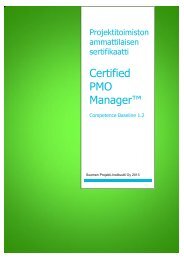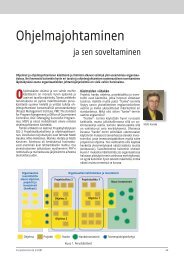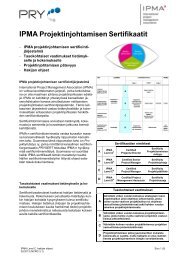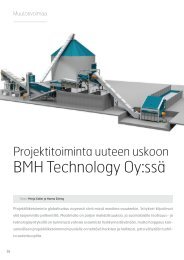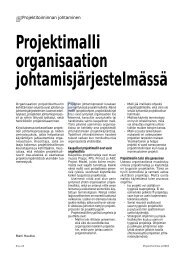Boundary activities and readiness for ... - Projekti-Instituutti
Boundary activities and readiness for ... - Projekti-Instituutti
Boundary activities and readiness for ... - Projekti-Instituutti
Create successful ePaper yourself
Turn your PDF publications into a flip-book with our unique Google optimized e-Paper software.
Discussion<br />
5.2.3 Program autonomy as a central enabler of change<br />
One of the key findings of the study relates to the requirement <strong>for</strong> program<br />
autonomy. During the empirical analysis, the concept of program autonomy<br />
emerged from the research data <strong>and</strong> was included as one of three main<br />
dimensions of <strong>readiness</strong> <strong>for</strong> change program implementation. This<br />
autonomy was analyzed to consist of two aspects: the program’s legitimate<br />
position in the organization, <strong>and</strong> the program actors’ authority to use the<br />
resources <strong>and</strong> realize the planned changes.<br />
During the past decade, the autonomy of projects <strong>and</strong> other temporary<br />
organizations has attracted growing attention among the scholars of the<br />
field. Previous research has described project autonomy (or a project team’s<br />
autonomy) as its freedom to evolve without constant intervention by the<br />
parent organization (Lampel & Jha, 2004), <strong>and</strong> as the project’s authority to<br />
set its own goals, define its own identity <strong>and</strong> boundaries, its resources to<br />
complement its task <strong>and</strong> its freedom to organize the behavior of its<br />
members (Gemünden et al., 2005). Project autonomy has also been<br />
depicted as a contextual factor that must be taken into account in defining a<br />
project’s strategy (Artto, Kujala et al., 2008; Artto, Martinsuo et al., 2008).<br />
Recent studies on project autonomy by Martinsuo <strong>and</strong> her colleagues<br />
suggest that project autonomy appears in constant interplay with the<br />
surrounding stakeholder environment, showing how the parent<br />
organization enables <strong>and</strong> constrains project autonomy (Martinsuo &<br />
Lehtonen, 2009) <strong>and</strong> how the project manager may have an active role in<br />
shaping the project’s autonomy by regulating external integration<br />
(Martinsuo, Aaltonen, & Lehtonen, 2010). Consistent with this view, the<br />
current study proposes that the key managers of an emerging program<br />
must actively promote program autonomy in cooperation with the parent<br />
organization’s representatives.<br />
While previous studies on project autonomy have provided inconclusive<br />
evidence of the role of project autonomy in project success (Gemünden et<br />
al., 2005; Hoegl & Parboteeah, 2006), the current study proposes<br />
autonomy to be critical <strong>for</strong> the success of change programs in terms of<br />
creating <strong>readiness</strong> <strong>for</strong> program implementation. This proposition is<br />
supported by recent research that has suggested autonomy to be especially<br />
relevant in innovative, novel, <strong>and</strong> complex projects (cf. Martinsuo &<br />
Lehtonen, 2009). The present study suggests that program autonomy does<br />
not readily exist but it must be actively produced, <strong>and</strong> the findings provide<br />
empirical evidence of mechanisms <strong>for</strong> promoting autonomy during change<br />
program initiation.<br />
Based on the present findings, sufficient program autonomy means that<br />
the program has the required authority to act, to use resources, <strong>and</strong> to<br />
200



